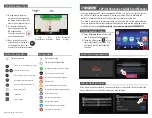
Post-Installation Configuration & Checkout
Apollo CNX80 Installation Manual
560-0982-00 Rev D
3-29
1.
Apply power to the equipment, and after the CNX80 splash screen clears press the
SUSP
bezel key on
the CNX80
three times
to go into Simulator Mode. Press the
MENU/ENTER
key to acknowledge
entry into the Simulator Mode. Allow the CNX80 to complete its normal start-up sequence.
2.
In the CNX80, set a course to a destination waypoint. This can be done by pressing the
NRST
bezel
key to display a list of nearby waypoints. Then use the large, outer knob to select a suitable waypoint
and press the
DIRECT-TO
bezel key, followed by the
Direct
line select key.
3.
Press the
MAP
bezel key and then press the
SPD
smart key to verify the simulated ground speed.
Ensure that the ground speed is set to 120 kts (if necessary, the ground speed can be adjusted using the
small, inner knob and then pressing the
MENU/ENTER
key to acknowledge the entry).
CAUTION
When the autopilot is engaged, flight control surface movement can occur.
4.
Engage the autopilot in GPSS mode.
Verify that GPSS is valid via the autopilot annunciation.
5.
Press the CDI Select key to select Nav data on the CDI. Verify that the autopilot annunciates GPSS
Fail.
6.
Exit the Simulator Mode by turning the CNX80 off and then back on.
7.
Verify all other connections between the CNX80 and the autopilot (e.g. the deviation signals and flags).
These signals can be simulated using the Ground Maintenance mode (see section 3.3.1).
3.3.2.4.10 RMI/OBI
The CNX80 RMI/OBI output can be used to drive an RMI (or OBI) navigation indicator. This check
verifies that the RMI/OBI is receiving data from the CNX80. If the following steps do not perform
correctly, check the electrical connections and configuration setup.
1.
Apply power to the equipment and wait for the CNX80 to acquire a position.
2.
In the CNX80, set a course to a destination waypoint. This can be done by pressing the
NRST
bezel
key to display a list of nearby waypoints. Then use the large, outer knob to select a suitable waypoint
and press the
DIRECT-TO
bezel key, followed by the
Direct
line select key.
3.
If an external RMI select switch is installed, set it to the GPS position (if no switch is installed, the
CNX80 output automatically defaults to GPS data).
4.
Verify that the RMI needle swings and points towards the GPS waypoint selected
NOTE
The aircraft heading system must be operating properly in order for the RMI needle to
point correctly.
5.
If installed, set the RMI select switch to the Nav position. Tune a local VOR station, or use a
simulated signal from an approved VOR Test System.
6.
Verify that the RMI needle swings and points towards the VOR station.
3.3.2.4.11 DME
The CNX80 can channel a DME based upon the tuned VOR frequency. This check verifies that the
CNX80 is properly tuning the DME. If the following steps do not perform correctly, check the electrical
connections and configuration setup.
1.
Tune a co-located VOR/DME station. Listen to the DME ident via the audio panel and ID the station
to verify that it is correct.
2.
Tune an invalid VOR station. Verify that the DME changes to an invalid station.
Summary of Contents for Apollo CNX80
Page 1: ...Apollo CNX80 Installation Manual September 2003 560 0982 00 Rev D...
Page 10: ...Table of Contents viii 560 0982 00 Rev D Apollo CNX80 Installation Manual NOTES...
Page 30: ...General Information 1 20 560 0982 00 Rev D Apollo CNX80 Installation Manual NOTES...
Page 114: ...Periodic Maintenance 6 2 560 0982 00 Rev D Apollo CNX80 Installation Manual NOTES...
Page 134: ...Appendix D Interconnect Diagrams D 2 560 0982 00 Rev D Apollo CNX80 Installation Manual NOTES...
Page 167: ......
Page 168: ......
















































